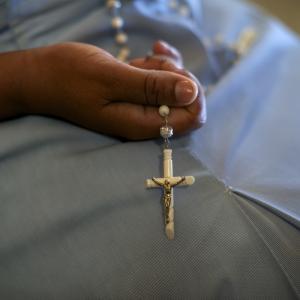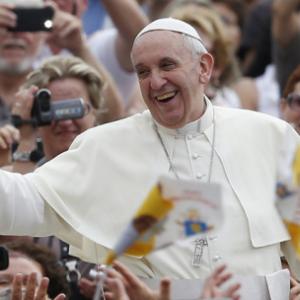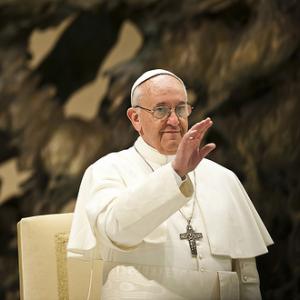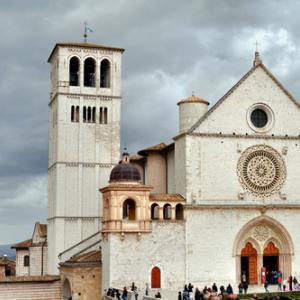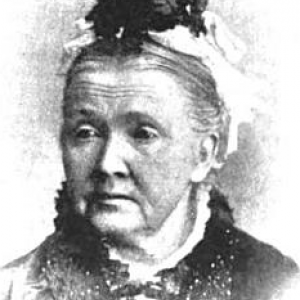Margaret Benefiel, Ph.D., Executive Director of the Shalem Institute (www.Shalem.org), has served as Chair of the Academy of Management's Management, Spirituality, and Religion Group. She also serves as Co-chair of the Christian Spirituality Group of the American Academy of Religion. Over 1,000 executives, managers, and other leaders have participated in her seminars and courses. Author of Soul at Work and The Soul of a Leader, and co-editor of The Soul of Supervision, Dr. Benefiel has also written for The Leadership Quarterly, Management Communication Quarterly, Managerial Finance, Journal of Organizational Change Management, Organization, Personal Excellence, Psychology of Religion and Spirituality, America, Presence, The Way, Studies in Spirituality, Radical Grace, and Faith at Work. She lives with her husband in Washington, D.C. and enjoys hiking, cycling, reading novels, and scuba diving in her free time.
Posts By This Author
Myanmar's Test: Aung San Suu Kyi and the Test of Peaceful Transition

Image via Reuben Teo/Shutterstock.com
The Nobel laureate and human rights advocate Aung San Suu Kyi entered the Myanmar Parliament this week, shortly after her party, the National League for Democracy, won the country's first free election in 25 years.
In those 25 years — since the 1990 election, which the NLD also won — Aung San Suu Kyi spent a total of 15 years without her freedom, having been placed under house arrest by the ruling military government which ignored the election results.
Since 1988, Ms. Suu Kyi has led nonviolent opposition to the military government. Last week’s landslide election results, which took the ruling generals by surprise, demonstrate once again that nonviolence is a force more powerful than violence.
In Every Human Heart
News reports about the trial and the jury’s deliberations spark fury online. Tempers rise as commenters express their opinions about what they believe should be Tsarnaev’s fate. For example, when the Catholic bishops stood in front of the courthouse expressing their opposition to the death penalty, many responded with outrage: “He should be made to suffer as much as he made others suffer.” “Let him fry.” “Torture him and then kill him.” Similarly, when Bill and Denise Richard, the parents of the 8-year-old boy killed by the explosion, wrote a letter expressing their desire to take the death penalty off the table, their views provoked ire.
What motivates these different perspectives? Is justice about vengeance, an eye for an eye and a tooth for a tooth? Is someone who advocates for life imprisonment soft on crime? Is such a person naïve?
Vetoing the Keystone XL Pipeline: Moral Leadership for the Environment
Like Jim Wallis, I believe that budgets are moral documents. They reflect our deepest values. Like budget decisions, climate decisions are moral decisions — decisions that affect the environment reveal our moral commitments.
How does Barack Obama measure up on the ‘moral leadership for the environment’ scorecard?
President Obama vetoed the Keystone XL pipeline on Tuesday. He also forged a historic agreement with Chinese Presidenta Xi Jinping in November to reduce carbon emissions in the U. S. by 26-28 percent from 2005 levels by 2025. He has worked with the auto industry to put historic fuel economy standards into place. When he wasn’t able to convince Congress to pass environmental legislation, he worked behind the scenes — using the Clean Air Act of 1970 to set tougher environmental standards. All of these actions give him points for moral leadership.
At the same time, some criticized Obama earlier in his presidency for not doing enough. In 2011, Al Gore published an article in Rolling Stone magazine saying Obama had “thus far failed to use the bully pulpit to make the case for bold action on climate change.” During the first two years of his administration, many environmental activists expected more legislation to slow climate change. Cole Stangler argues that, even given legislative obstacles, Obama could have done more through federal agencies.
American Nuns: Grounded Leadership in Conflict
Last week the Vatican released the final report on its unprecedented investigation of Roman Catholic sisters in the United States. Six years ago, when the Vatican announced the apostolic visitation (its formal name), many of the sisters whom the investigation affected responded with hurt and anger. Now, thanks largely to competent, spiritually grounded leadership on the part of American sisters, the spirit is conciliatory.
When the Vatican launched the investigation in 2008, under Pope Benedict, to “look into the quality of life of religious women in the United States,” the announcement was met with suspicion and apprehension. Since the Vatican had previously only ordered an apostolic visitation when a group had gone astray, sisters wondered what the Vatican wanted to investigate and why. Some congregations reported that their elder sisters felt that their whole lives had been judged and found wanting," remembers Sr. Sharon Holland, president of the Leadership Council of Women Religious, which represents about 80 percent of the 57,000 nuns in the U. S. When Sr. Sandra Schneiders, professor emerita of New Testament and spirituality at the Jesuit School of Theology in Berkeley, Calif., learned of the visitation, she warned sisters to be cautious, treating the visitors as “uninvited guests who should be received in the parlor, not given the run of the house.”
In a situation that could have escalated badly, American sisters rose to the occasion.
This Veterans Day, Work for Peace
In the wake of the latest escalation of the U.S. “war on terror,” it’s time to remember the origin of Veterans Day. In 1926, Congress officially recognized the commemoration of Armistice Day on Nov. 11 with the exhortation, “the recurring anniversary of this date should be commemorated with thanksgiving and prayer and exercises designed to perpetuate peace through good will and mutual understanding between nations.” Armistice Day commemorated the day when World War I hostilities ceased, and had been celebrated informally since 1919 as a day to work for peace.
Pope Francis: Giving the Work Back to the People at a Rate They Can Stand
This weekend, more than 800,000 spectators crowded the St. Peter’s Square area while 500,000 more watched on giant screens around Rome as Pope Francis canonized Pope John XXIII and Pope John Paul II. The first time a pope has sainted two popes at the same time, this historic event has been called a savvy political move by the media, since Pope Francis recognized both the more liberal John XXIII and the more conservative John Paul II, thus satisfying two opposing wings of the Roman Catholic church. While Pope Francis did indeed display political savvy at this canonization, this event holds far more significance than that (even leaving aside the spiritual question of discerning sainthood).
Pope Francis -- Moral Leadership for the Economy
Pope Francis, in his message for the World Day of Peace on Jan. 1, stresses the concept of fraternity as the basis for a moral economy, moral society, and moral relationships among nations.
A longing for fraternity, the pope argues, lives within every human heart.
In the heart of every man and woman is the desire for a full life, including that irrepressible longing for fraternity which draws us to fellowship with others and enables us to see them not as enemies or rivals, but as brothers and sisters to be accepted and embraced. Fraternity is an essential human quality, for we are relational beings. A lively awareness of our relatedness helps us to look upon and to treat each person as a true sister or brother; without fraternity it is impossible to build a just society and a solid and lasting peace.
Too often, Pope Francis explains, this human desire for fraternity has been undermined by other human inclinations, those of selfishness, envy, and greed. He argues that those inclinations form a poor foundation for human societies and economies, and that we must build a foundation for society and the economy based on the “transcendent dimension” of humanity:
Nelson Mandela and the Power of Elders
The world lost a hero yesterday. Nelson Mandela, 95, died at his home in Johannesburg, South Africa, after a long illness.
From prisoner of 27 years to President of his country, Mandela exhibited courage and vision for a country that had feared a bloodbath in its transition to a post-apartheid society. Mandela united the country through the Truth and Reconciliation Commission.
A less-noted aspect of Mandela’s work was his founding of The Elders on his 89th birthday. With a mission of “offer[ing] their collective influence and experience to support peace building, help address major causes of human suffering and promote the shared interests of humanity.” Mandela gathered Jimmy Carter, Kofi Annan, Mary Robinson, Desmond Tutu, Muhammed Yunus, and others to harvest the wisdom of their years for the good of the planet. Founding member Peter Gabriel further explained: “In traditional societies, the elders always had a role in conflict resolution, long-term thinking, and applying wisdom wherever it was needed. We are moving to this global village and yet we don’t have our global elders. The Elders can be a group who have the trust of the world, who can speak freely, be fiercely independent, and respond fast and flexibly in conflict situations.”
Honor Veterans Day by Working for Peace
World War I hostilities ceased at 11 a.m. on the 11th day of the 11th month, Armistice Day, 1918. Dubbed “The war to end all wars,” World War I closed with a commitment to peace. A year later, President Woodrow Wilson proclaimed Nov. 11, 1919, the first commemoration of Armistice Day, a day for America “to show her sympathy with peace and justice in the councils of the nations.”
When, in 1926, the U. S. Congress officially recognized the commemoration, it proclaimed, “the recurring anniversary of this date should be commemorated with thanksgiving and prayer and exercises designed to perpetuate peace through good will and mutual understanding between nations.” Armistice Day became a legal holiday in 1938, as a day dedicated to the cause of world peace.
In a culture of war and empire, it’s time to reclaim Nov. 11 as a day of peace.
Following in the Footsteps of Francis
Ancient stones, steep stairs, and sparkling fresh air greeted me upon arrival in Assisi, Italy, a month ago. Lush olive groves, leaves iridescent in the sun, offset the city stones. “What sort of place is this, that shaped St. Francis 800 years ago?” I asked myself. Eager to deepen my understanding of the saint, I had returned to Assisi to walk in the footsteps of St. Francis.
Profligate playboy, drama king, dejected knight, young Francis lived life large. He grew up in turbulent times, with civic unrest in Assisi and war with nearby Perugia surrounding him. Returning from a year as a prisoner of war in Perugia, sick and weak, Francis drifted. When he sold his cloth merchant father’s wares to repair a church, his father chained him in punishment. Francis stripped in public, denouncing his father. Unlikely material for a saint.
Yet God shaped Francis over time, and Francis yielded. A simple saint, Francis wanted one thing. Nothing but God, he proclaimed, shedding all else. He chose a life of simplicity, serving the poor, and calling the church to reform.
Mandela, Martin, and Ubuntu
What better way to honor Nelson Mandela on his 95th birthday today than to reflect on his concept of Ubuntu? Ubuntu, a word from the Bantu languages of southern Africa — roughly translated “I am because we are” — sums up Mandela’s approach to leadership, incorporating a generous spirit and concern for the wellbeing of one’s community.
A Mother’s Day for Peace in our Cities
Julia Ward Howe, best known for writing "The Battle Hymn of the Republic" in 1862, began working to heal the wounds of the Civil War once the war ended. By 1870 Howe had become convinced that working for peace was just as important as her efforts working for equality as an abolitionist and suffragette. In that year she penned her "Mother's Day Proclamation," exhorting women to:
“Say firmly: ‘We will not have great questions decided by
irrelevant agencies.
Our husbands shall not come to us, reeking
with carnage, for caresses and applause.
Our sons shall not be
taken from us to unlearn all that we have been able to teach
them of charity, mercy and patience.
We women of one country will be too tender of those of another
country to allow our sons to be trained to injure theirs.
From the bosom of the devastated earth a voice goes up with our own.
It says "Disarm, Disarm! The sword of murder is not the balance
of justice.’"
Experiments in Love
When I got off the plane at O’Hare Airport in Chicago on my way home to Boston on April 15, I couldn’t believe my eyes. Televisions blaring everywhere showed my beloved city at her premier event of the year, the Boston Marathon. Everyone knows the rest of the story.
“Is this for real? How can this be?” I asked, unable at first to face the reality of what had occurred. Feelings of fear and anger followed quickly on the heels of the denial.
Leaders responded quickly: the mayor, the governor, the president. “Any responsible individuals, any responsible groups will feel the full weight of justice,” promised President Barack Obama.
What is justice? Vengeful words immediately spewed from talk shows and bloggers’ keyboards. “We must catch them alive and make them suffer as much as possible. That will pay them back for what they did,” spewed those who equate justice with revenge.
Of course, violence begets more violence. Gandhi put it succinctly: “An eye for an eye makes the whole world blind.” Paul exhorted the Romans, “Repay no one evil for evil, but take thought for what is noble in the sight of all. . . Beloved, never avenge yourselves, but leave it to God, for it is written, ‘Vengeance is mine, I will repay,’ says the Lord. (Romans 12:17,19.)”
The Sanctity of Labor and the Challenges Before Us
Yesterday, the U.S. and Canada celebrated Labor Day, a day honoring workers. What does it mean to honor workers at a time of high unemployment, job insecurity, and the threat of lay-offs? In the U.S., the unemployment rate remains just over 9 percent, with no decrease of the rate in August and the recovery of jobs apparently stalled. As President Obama prepares to deliver his "jobs speech" this week, he faces immense challenges.
In the U.S., the first celebration of Labor Day was held in 1882 in New York City, organized by the Central Labor Union. In Canada, Labor Day can be traced back even further, to when Toronto Typographers went on strike for a 58-hour work week in 1872. Religious leaders, both nationally and internationally, recognizing the sanctity of labor, joined labor leaders in calling for justice for workers. Pope Leo XIII, for example, issued Rerum Novarum (On the Condition of Labor) in 1891, building a biblical foundation for the dignity of the worker.
The Works of the Flesh and the Debt Ceiling Deal
In Galatians 5:19-20, Paul lists the "works of the flesh," contrasting them to the "fruit of the Spirit" immediately thereafter (Gal. 5:22-23). Among the works of the flesh are hostility, quarreling, jealousy, outbursts of anger, selfish ambition, dissension, and division. Another translation puts it, "People become enemies and they fight; they become jealous, angry, and ambitious. They separate into parties and groups ... I warn you now as I have before: those who do these things will not possess the kingdom of God."
A Mother's Day for Peace
Was Jesus a Passive Doormat?
Nonviolence is More Powerful Than Violence
Who Will Speak for Our Nation's Soul?
BP's Betrayal of Its 'Beyond Petroleum' Branding
As BP's oil spill in the Gulf of Mexico worsens by the day, the world's eyes are on the http://www.bp.com/sectiongenericarticle.do?categoryId=9014510&contentId=...


